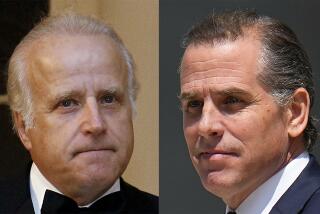Rove’s Texas two-step
- Share via
CONGRESS WANTS TO hear from Karl Rove, and members want him sworn in. Rather than accept a politically expedient deal from the White House -- a no-oath interview -- Senate and House committees have approved subpoenas for Rove and others. Lawmakers hope to figure out whether Rove hatched the plan to fire U.S. attorneys who were not hewing to the Republican Party’s political playbook.
Whether Rove chats or testifies, Congress will surely be frustrated. Asking Rove questions is simply not an effective method of ascertaining facts. Reporters who, like me, have dogged the presidential advisor from Texas to Washington quickly learn how skilled he is at dancing around the periphery of issues. Any answers he does deliver can survive a thousand interpretations. Few intellects are as adept at framing, positioning and spinning ideas. That’s a great talent for politics. But it’s dangerous when dealing with the law.
Rove has testified under oath before investigative bodies twice, and in neither case was the truth well served. In 1991, he was sworn in before the Texas state Senate as a nominee to East Texas State University’s board of regents. The state Senate’s nominations committee, chaired by Democrat Bob Glasgow, was eager to have Rove explain his relationship with FBI agent Greg Rampton.
Rampton was a controversial figure in Texas, and Democrats suspected that he’d been consorting with Rove for years. During the 1986 gubernatorial race, when a listening device was discovered in Rove’s office, it was Rampton who investigated. No one was ever charged -- and Democrats suspected that Rove planted the bug himself to distract reporters from the faltering campaign of his client, Bill Clements (who won the election).
Then, in 1989, Rampton launched a series of devastating investigations into every statewide Democratic officeholder in Texas, including Agricultural Commissioner Jim Hightower. Rove (at the time running Republican Rick Perry’s campaign for that job) often leaked things to reporters, such as whose names were on subpoenas before they were issued.
So when the Texas state Senate committee found nominee Rove before it in 1991, members thought they had the power to get at the truth.
“How long have you known an FBI agent by the name of Greg Rampton?” Glasgow asked.
Rove paused for a breath. “Ah, senator, it depends -- would you define ‘know’ for me?”
Rove, who later vilified President Clinton’s request for a definition of “is,” clearly had his own linguistic issues.
But Glasgow pressed on: “What is your relationship with him?”
Rove said: “Ah, I know, I would not recognize Greg Rampton if he walked in the door. We have talked on the phone a var- -- a number of times. Ah, and he has visited in my office once or twice, but we do not have a social or personal relationship whatsoever....”
Rove’s famous memory, which recalls precinct results from 100-year-old presidential elections, often seems trained only to serve his political ends. In an interview with me after the 2000 presidential election, Rove said he did not remember meeting with Rampton at all. But in fact, Rove had met with Rampton -- and he even disclosed it on a questionnaire after George H.W. Bush nominated him to the Board for International Broadcasting. In sworn documents, Rove stated that he met with Rampton in 1990 during the investigation of Hightower -- an encounter that surely fits the definition of “know.”
Rove’s memory also made some creative leaps during a pretrial hearing in 1993. Travis County Dist. Atty. Ronnie Earle was preparing to prosecute Rove client Kay Bailey Hutchison, who was the Texas state treasurer. A grand jury had indicted her for allegedly using government phones and computers to raise campaign money. When law enforcement officers raided the treasurer’s building to confiscate evidence, reporters documented the whole thing.
Hutchison’s attorneys filed for a change of venue because of a perceived political and media imbalance, which they insisted made a fair trial impossible in Austin. Rove, called to the stand to offer evidence of bias against Republicans, told the court that two reporters had informed him that they were tipped off to the raid by D.A. investigators.
Under oath, Rove named David Elliot of the Austin American-Statesman and Wayne Slater from the Dallas Morning News as the reporters. Both men later told me they hadn’t spoken with Rove, nor had they told anyone they had received a tip from the D.A.’s office. They had gotten a call from staffers at the treasurer’s office, which is precisely how all of the other journalists, including myself, learned about the raid.
If Rove winds up under oath before Congress, members will get a command performance by a man with masterful communications skills. They can expect to hear artful impressions, bits of information and a few stipulated facts.
But they should not expect the truth.
More to Read
Get the L.A. Times Politics newsletter
Deeply reported insights into legislation, politics and policy from Sacramento, Washington and beyond. In your inbox three times per week.
You may occasionally receive promotional content from the Los Angeles Times.










